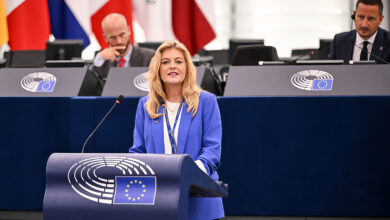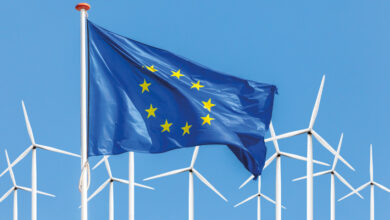The case for
 Brigid Laffan, Chairperson of Ireland for Europe, makes the case for voting ‘yes’ in the Lisbon Treaty referendum.
Brigid Laffan, Chairperson of Ireland for Europe, makes the case for voting ‘yes’ in the Lisbon Treaty referendum.
It is generally accepted that the EU has been good to Ireland and that Ireland has benefited from EU membership. The EU conjures up images of EU-funded roads, agricultural supports, reduced roaming charges for mobile phones, the euro and blue flags on clean beaches. From 1973 to the early 1990s, Ireland’s goal was to catch-up economically with the richer European states. Having achieved that, Ireland entered into a different and more uncertain relationship with the EU. This was underlined by the rejection of the Lisbon Treaty in June 2008, the second rejection of a European treaty this decade.
Underpinning this uncertainty was a taking for granted of the benefits of the EU in the past and a sense that Ireland’s positive relationship with the EU might not continue into the future. There may also have been a feeling that Ireland no longer needed the EU quite as much as it did in the past.
As we enter into another debate on the Lisbon Treaty, it is important to explore just what the EU means to Ireland’s future and why the EU needs Lisbon. There is much to be said on this but I would distil the importance of the EU to Ireland as follows: first, the EU is Ireland’s indispensable anchor and shelter for dealing with the world, and second it is a natural home for this small state and its people.
The images of anchor and shelter capture the importance of the EU to Ireland as a small state that is very open to the world economy, one of the top five most globalised countries in the world, exporting 80 per cent of what we produce. The economic crisis brings home to us the importance of exports to prosperity. The home produced construction bubble brought this country to its knees and Ireland will have to trade itself out of it. The EU offers a very big home market, a launch-pad to global markets, negotiating power in the WTO and a buffer against global competition. The big challenges of energy and climate change can only be dealt with by Europe acting together. No European country, including Ireland, can solve these problems on its own.
Nor should we forget the importance of the EU as a shelter. All we have to do is contrast the experience of Ireland and Iceland during the recent financial crisis. As Iceland looked around the world searching for financial support, Ireland was secure in membership of the euro and the European Central Bank became and remains a major provider of liquidity to the Irish financial system. Iceland becomes the latest country to apply for membership.
Ireland’s future in the EU is not just about the economy but crucially about the identity of this state and its place in the world. Ireland and the Irish are part of a historic and unprecedented attempt to forge strong ties of co-operation based on the rule of law among Europe’s states and its peoples. Writing in the early part of the 20th century, Joseph Chamberlain, politician and father of the future British Prime Minister, Neville Chamberlain, is reputed to have said: “The day of small nations has long passed away. The day of Empires has come.” In fact empires have fallen and the EU has provided small states, including Ireland, with a secure place in a rapidly changing world. The EU is not over there in Brussels but an indispensable part of what we are.
Given that we are being asked to think again, it is important to explore just why the EU needs Lisbon and why it spent over seven years negotiating on institutional reform. The Lisbon Treaty enhances the constitutional architecture of the EU. It is superior to the Nice Treaty, the current governing treaty of the union, in three important respects to do with Europe’s role in the world, the democratic fabric of European integration and the union’s capacity to act. Lisbon will not solve all of the challenges facing Europe in the world but it is vital to the union’s search for greater global coherence and presence.
Under Lisbon provisions, the High Representative of the Union for Foreign Affairs and Security Policy chairs the Council of Foreign Ministers and is also a member of the Commission thus bringing together the political, economic and security dimensions of foreign policy for the first time. Increasingly as the 21st century passes, Europe will be a smaller part of a rapidly changing world.
If the member states speak together on the international stage, their influence is much greater than any one member state, including the large.
Lisbon builds up the democratic fabric of the EU in a number of important respects. It provides a map of the values that underpin the EU. A reading of the opening articles of the Lisbon Treaty leaves no doubt about the strong normative dimension that characterises the EU. Those articles are further strengthened by the Charter of Fundamental Rights which will become part of the union’s legal architecture if Lisbon is ratified. The democratic fabric of the union is further strengthened by the increased powers of the European Parliament and national parliaments and the provision for petitions by individual citizens banding together. This treaty is good for people and parliaments.
The provisions of the Lisbon Treaty will enable the union of 27 and more states to function more efficiently and transparently. The provisions of Lisbon are much clearer about the competences of the union and the competences of the member states. The new voting system is far simpler than the existing one and its
dual character protects the interests of both large and small states. The identification of a new role, President of the European Council, will endow the Council with a personality and a coherence that it has lacked heretofore.
As we vote on 2 October, the Irish electorate has an opportunity to think again on Lisbon. The context has changed because of the recession. The question has changed because the guarantees provide clarification and reassurance on a number of issues and retain an Irish Commissioner. The outcome of the referendum will have a major impact on Ireland’s future economic and political well-being. In tough times, Ireland is better served by fully embracing the Lisbon Treaty, a treaty that reforms the EU and enhances its capacity to address global challenges. This treaty is good for Ireland and good for Europe.
Professor Brigid Laffan is Principal of the College of Human Sciences, University College Dublin, and former Jean Monnet Professor of European Politics, UCD. She has written extensively on the European Union.





